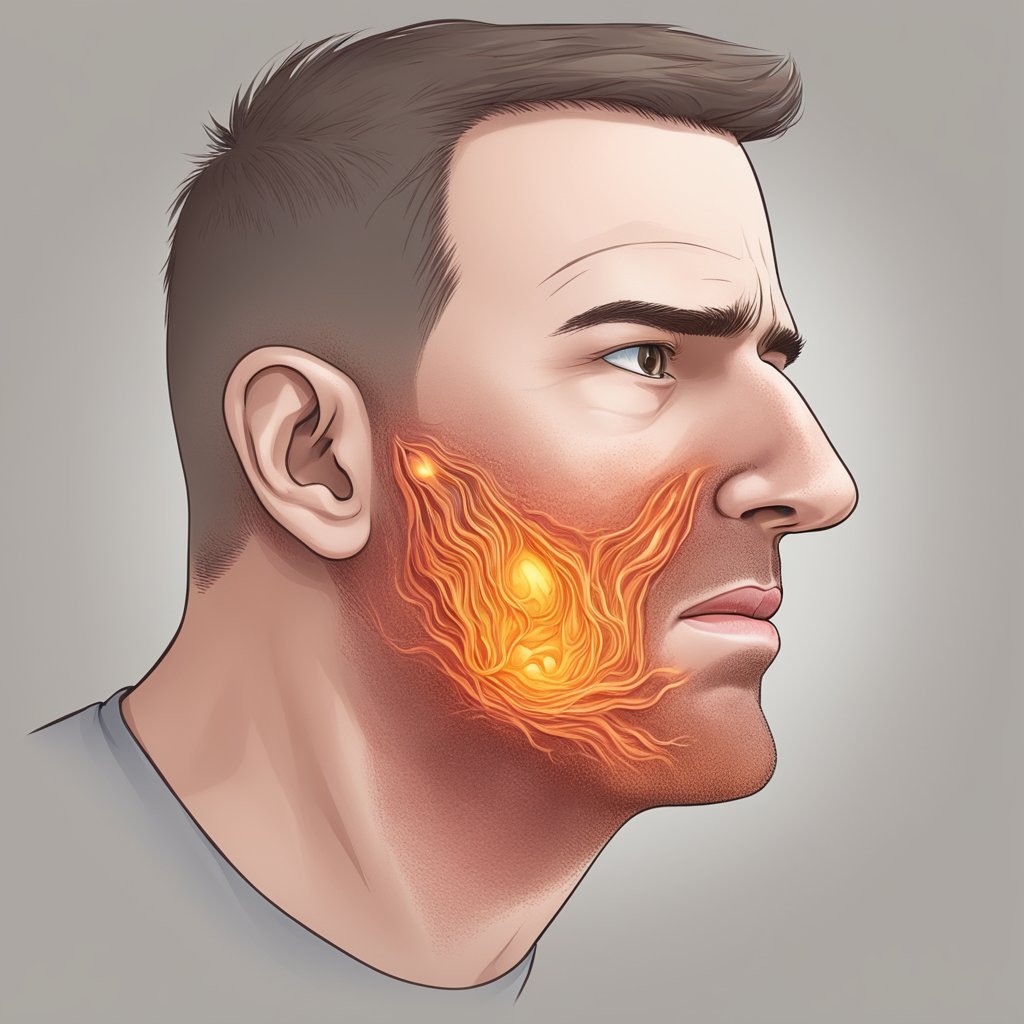Soreness in the nose is a common issue many people experience at some stage in their lives. This discomfort can arise for various reasons, ranging from the simple to the more complex. Causes might include environmental factors, such as dry air or allergies, or it could be due to more direct issues like nasal infections or injuries. Understanding the potential causes of a sore nose is crucial for determining how to treat it and how to prevent future occurrences.

Symptoms accompanying a sore nose can vary. They often include pain, a burning sensation, or tenderness when touching the nose. WebMD states that congestion or a runny nose may also be present, depending on the underlying cause. If the soreness is due to an infection, symptoms could extend to include fever, headache, and general fatigue. Treatment options vary depending on the diagnosis, which a healthcare professional can provide based on the symptoms and a physical examination. Treatments may range from simple home remedies and over-the-counter medications to prescriptions or other medical interventions if an infection is confirmed or if the soreness is persistent.
Preventative measures are essential to address to reduce the recurrence of nasal soreness. Maintaining good nasal hygiene, using a humidifier in dry environments, and avoiding known allergens can help prevent discomfort. However, if the soreness persists or is accompanied by other concerning symptoms, it is important to seek medical advice to rule out more serious conditions and to obtain a proper prognosis.
Key Takeaways
- Nose soreness can stem from various causes, such as environmental factors or infections.
- Symptoms range from pain and tenderness to congestion, with treatment depending on diagnosis.
- Prevention is key, and seeking medical advice for persistent symptoms is important for proper care.
Symptoms and Causes

In assessing a sore in the nose, I recognize the necessity to distinguish between symptoms that individuals might experience and uncover potential causes. One needs to be methodical in evaluating these elements to determine the appropriate course of action for relief and healing.
Identifying Symptoms
The symptoms of a sore in the nose can vary, but commonly include:
- Pain or Tenderness: A sensation of discomfort or pain when touching the nose.
- Redness or Swelling: Visible inflammation or puffiness within the nostril area.
- Blisters or Spots: Formation of small, fluid-filled bumps or raised spots.
- Pus or Discharge: The presence of yellow or white pus indicating an infection, often seen with a runny nose.
- Irritation: This can be from minor causes such as blowing the nose too frequently during a cold or fever.
- Pressure in the Sinuses: Related to headaches or a feeling of fullness, often in connection with sinus issues.
Underlying Causes
A sore in the nose might stem from a variety of causes:
- Infections: Viral infections, such as the common cold, or bacterial infections, like those caused by staphylococcus bacteria, can incite nasal vestibulitis. Localized infections can also lead to pimples or boils within the nostril.
- Trauma: Minor injuries or repeated trauma such as frequent nose-blowing or picking can damage the delicate skin inside the nose leading to soreness.
- Allergic Reactions: Allergies can cause a runny nose and inflammation which may result in a sore feeling.
- Systemic Conditions: Certain systemic health issues, such as an impaired immune system, can lead to persistent sores not just in the nose but throughout the body.
- Skin Conditions: Disorders such as herpes simplex virus can provoke blisters, while other skin conditions may lead to bumps and irritation.
Diagnosis and Treatment Options
When dealing with a sore in the nose, obtaining a professional diagnosis is crucial to identify the cause and determine the appropriate treatment options. Treatment can range from simple self-care to prescriptions and, in rare cases, surgery.
Professional Diagnosis
My first step is to consult with a healthcare professional if I experience persistent discomfort or signs of infection in my nasal passages. During a visit, the doctor will examine my nose for signs of sinus infection, celluitis, or allergic reactions. They might check for fever or look for complications that could affect my lungs or even my brain. Diagnostic tests, such as swabs or imaging, are options depending on the severity.
- Fever or severe pain warrants immediate attention.
- Swelling or redness might indicate celluitis or a more serious infection.
Available Treatments
Once diagnosed, the doctor might prescribe medications. For bacterial infections, antibiotics are common; an oral antibiotic can address sinusitis. Nasal passage soreness from viral infections may require antiviral medication. If allergies are the cause, antihistamines, steroids, or other allergy medications could be used to alleviate symptoms.
- Antibiotics: Prescribed for bacterial sinus infections.
- Antiviral Medication: Used for soreness from viral infections.
- Allergy Treatments: Can include over-the-counter or prescription medications.
Self-Care and Remedies
For minor sores or discomfort, I can address symptoms with home remedies and over-the-counter products.
- Pain Relief: Ibuprofen can reduce pain and swelling.
- Home Remedies: Saline nasal sprays or drops, petroleum jelly, and soothing oils can provide relief.
- Ointments: Topical antibiotics like bacitracin or mupirocin help with minor infections.
- Congestion: Decongestants can relieve stuffiness and improve breathing.
In conclusion, I ensure to follow a healthcare professional’s guidance to effectively treat a sore in my nose, using both medical treatments and self-care practices as recommended.
Prevention and Prognosis
In addressing nose sores, both prevention and understanding potential complications are key. An awareness of how to maintain nasal hygiene and a realistic expectation of outcomes ensures better management.
Preventing Nose Sores
To minimize the risk of getting nose sores, I emphasize the importance of maintaining good nasal hygiene. This may involve:
- Washing hands regularly to prevent the spread of infections.
- Using saline sprays or nasal gels to keep the nasal passages moist, especially during dry conditions.
- Being cautious with nose picking, as this can introduce bacteria and cause small cuts which may develop into sores.
- Avoiding irritants such as smoke, strong chemicals, and pollutants which can damage the delicate skin inside the nose.
- Proper care during nose piercings, ensuring it’s done by a professional and followed by proper aftercare to prevent infections.
Risk factors such as a weakened immune system can make an individual more prone to nose sores. Therefore, I suggest a diet rich in vitamins and minerals to help boost the immune system.
Outlook and Complications
The prognosis for nose sores is generally favorable, especially with early intervention. However, complications can arise:
| Complication | Description |
|---|---|
| Abscess | If bacteria invade, this may lead to the formation of a pus-filled pocket. |
| Cellulitis | A bacterial infection which can cause redness, swelling, and discomfort, potentially spreading to other skin areas. |
| Scarring | Repeated or severe sores could lead to permanent marks or damage inside the nose. |
| Crusting and Scabbing | Normal healing processes, but if persistent, they may indicate an underlying condition. |
Preventing pressure or trauma to the nasal passages can reduce the risk of sores and related complications. If nose sores are frequent and persistent, or if they are associated with other severe symptoms, I advise consulting a healthcare professional for targeted treatment.
When to See a Doctor
Experiencing a sore in your nose can be uncomfortable, but it’s not always a cause for serious concern. However, certain symptoms may indicate the need for medical attention. If I notice severe symptoms, such as intense redness, fever, headache, bleeding that won’t stop, double vision, muscle aches, or a persistent cough, it’s important for me to consult a healthcare professional. These may be signs of an infection or other complications requiring a doctor’s diagnosis.
If I have recently undergone chemotherapy or another treatment that compromises my immune system, I should not hesitate to see a doctor. A compromised immune system can turn minor issues into severe ones, and even a small sore could lead to a significant infection.
| Risk Factors | Symptoms | Action |
|---|---|---|
| Recent Surgery | Redness, swelling | Seek medical advice |
| Chemotherapy | Fever, unusual pain | Contact healthcare provider |
| Prescription Medications | New or worsening symptoms | Discuss with a doctor |
For those on certain prescription medications that affect the immune system, the appearance of sores in the nose might be an adverse side effect, and a healthcare professional may need to adjust the medication or provide a treatment to address the sores. Additionally, should I experience symptoms that disrupt my daily activities or show no sign of improvement over several days, it’s prudent to seek a professional evaluation.
Recognizing when my symptoms may require medical expertise helps me take proactive steps in my health management. It’s always better to be safe and consult a healthcare professional for a proper diagnosis and potential treatment options.
Frequently Asked Questions
Knowing the specifics of sore treatment and prevention helps with effective management and can potentially expedite healing.
What are the common treatments for a sore inside the nose?
The treatment often includes saline sprays, topical antiseptics, and antibiotics if there is a bacterial infection. I recommend keeping the area clean and applying a warm compress to ease discomfort.
What could be the reasons for a sore in the nose not healing?
Non-healing sores in the nose may be due to persistent infections, repeated trauma, or underlying conditions like autoimmune disorders. I suggest consulting a healthcare professional if a sore is not healing as expected.
How can nasal vestibulitis be identified and managed?
Nasal vestibulitis, which is inflammation of the nostrils, presents with redness, pain, and sometimes crust formation. Management involves antibiotics and proper nasal hygiene. I find it prudent to avoid nasal irritants during treatment.
Why does my nose hurt when I press on it?
Pain upon pressing the nose can be caused by inflammation of the nasal tissues, a local infection, or a nasal injury. I believe it’s important to be cautious and seek medical advice if the pain persists or is severe.
What are the potential causes of ulcers inside the nose?
Ulcers within the nose may result from infections, chronic inflammation, drug use, or an immune response. Identifying the root cause is essential for my treatment approach to be effective.
Can you explain what might cause the recurrence of sores in the nose?
Recurrent sores might be due to an unresolved infection, habitual picking, dry air, or an undiagnosed condition like herpes simplex virus. I advise maintaining good nasal hygiene and consulting a specialist when recurrent sores appear.